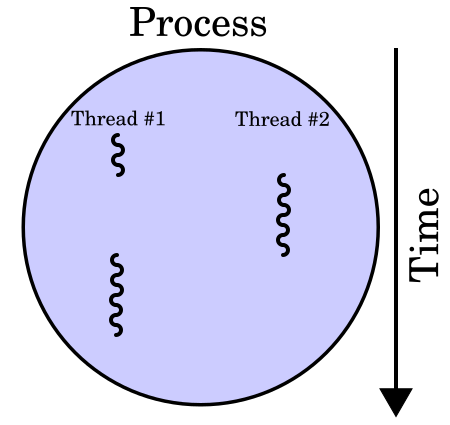

Why threads?
Thread scenario: user changes sentence one of an 800-page
book, then goes to make a second change. A singl-threaded
program must re-format the whole book, and then return
control to the user. With two threads, one formats and the
other handles user input. We can add a third-thread to
handle disk I/O.
Processes won't do here: they can't share the memory
containing the document.
Situation is tricky: think of all those times you have
clicked on the wrong link, because the mouse was live.
Process as group of resources versus process as thread of
execution.
Threads separate the latter from the former.
An analogy: we have theaters (resources) and in them we put
on plays (threads). In the process-only model, each play
gets its own theater. With threads, several plays can run
"at once" in a single theater, sharing lights, props,
ticket booths, etc.
| Per Process | Per Thread |
|---|---|
| Address space | Program counter |
| Global variables | Registers |
| Open files | Stack |
| Child processes | State |
| Pending alarms | |
| Signals and signal handlers | |
| Accounting information |
Threads have the same states as processes.
Upsides:
Downsides:
Example: Java threading and synchronized keyword.
Upsides:
Downsides:
The programmer can put some threads in kernel space, and some in user space.
Also tries to be the best of both worlds: here, the kernel
makes a call (upcall)
into user space to tell the user code that a thread has blocked.
Objection: Calls are supposed to go in the opposite
direction!
Imagine a web server, waiting for HTTP requests.
Usual approach: Have a process or a thread blocking,
waiting for a request to come in.
Pop-up approach: create a thread at the moment a
request arrives: the thread "pops up" just in time
to handle the request.
These can take over quickly, since they have no state to
restore.
Why this is tricky:
Shared resource: Bulletin board example.
Non-reentrant library calls: E.g, writing a file
with fwrite().
Signals: Who gets the signal? The OS doesn't know
about user-level threads.
The point: Conversion is hard work!